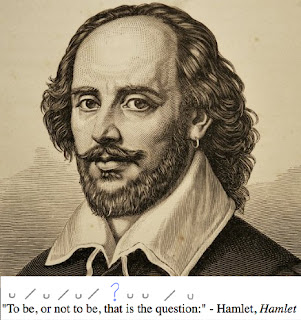Why Shakespeare Used Prose
Usually when people think of Shakespeare, they think of iambic pentameter (a meter of verse which contains five iambs, u /, per line), the heartbeat-echoing meter in which he wrote most of his plays and sonnets. But Shakespeare's frequent use of iambic pentameter makes us notice when he writes in prose (regular, everyday speech with no metrical pattern). An easy way to recognize prose on the page is the formatting of the lines; the words flow across the page. There is no absolute rule that can tell us why Shakespeare wrote in prose every time he did, but here are a few situations in which Shakespeare's characters speak in prose and explanations of why the prose is appropriate to the situation.
1. Drunkenness
Example 1: The Porter in Macbeth
The Porter in Macbeth is a classic example of a drunk, prose-speaking character. Even before the Porter himself tells us that he has been drinking for hours during the night, we can tell because he speaks in prose. Here is a short excerpt from the Porter's opening speech before answering Macduff at the gate.
"Here's a knocking, indeed! If a man were Porter of Hell Gate, he should have old turning the key. Knock, knock, knock. Who's there, i' th' name of Belzebub? – Here's a farmer, that hang'd himself on th' expectation of plenty: come in, time-pleaser; have napkins enow about you; here you'll sweat for't." (II.3.1-7)
Example 2: Stephano and Trinculo in The Tempest
Stephano and Trinculo, often drunk and often together, in The Tempest also make extensive use of prose. They carry bottles of wine to make sure that the audience knows they have been drinking, but their prose signals their drunkeness as well. Here is a short excerpt from Stephano, after he has just discovered Caliban on the island.
"He's in his fit now and does not talk after the wisest. He shall taste of my bottle; if he have never drunk wine afore, it will go near to remove his fit. If I can recover him and keep him tame, I will not take too much for him! He shall pay for him that hath him, and that soundly." (II.2.73-78)
2. Characters of Lower Social Status
This category overlaps somewhat with the first category, because the characters who are drunk in Shakespeare are often characters of lower status––including the Porter, Stephano, and Trinculo. Many of the characters of lower status who speak in prose are also comic reliefs.
Example 1: Malvolio in Twelfth Night
Another example of a character of lower status speaking prose is Malvolio, Olivia's butler, from Twelfth Night. Below is his speech to Cesario as he gives Cesario Olivia's ring.
"Come, sir, you peevishly threw it to her: and her will is, it should be so returned. If it be worth stooping for, there it lies, in your eye: if not, be it his that finds it." (II.2.13-16)
Example 2: Bottom and Quince in A Midsummer Night's Dream
Bottom and Quince, both workers, speak in prose in A Midsummer Night's Dream. Here is a brief excerpt of comic prose spoken by Bottom as he and the players prepare to present Pyramus and Thisbe.
"Some man or other must present Wall: and let him have somme plaster, or some loam, or some rough-cast about him, to signify wall; and let him hold his fingeres thus, and through that cranny shall Pyramus and Thisby whisper." (III.1.63-67)
3. Informal Gatherings or Intimate Moments
Although Shakespeare's blank verse approximates natural speech, it sounds more formal than prose (especially when the two are heard back-to-back). So, Shakespeare's use of prose can convey casual or intimate moments between characters––moments when the characters do not feel required to express respect or conform to strictness and formality of verse.
Example 1: Katherina and Petruchio in The Taming of the Shrew
Example 2: Antipholus and Dromio of Syracuse in The Comedy of Errors
4. Madness
Example 1: Lear in King Lear
When Lear goes mad in Act III of King Lear, he begins to speak in prose. As a character of high status, he speaks in verse for the first two acts. However, as he loses mental control, his thoughts become more and more disorganized. These unruly thoughts can no longer be confined in verse, and so Lear's madness flows freely in prose. Here is an excerpt of Lear's prose early in his madness.
"Why, thou wert better in a grave than to answer with thy uncovered body this extremity of the skies. Is man no more than this? Consider him well. Thou ow'st the worm no silk, the beast no hide, the sheep no wool, the cat no perfume. Ha? Here's three on's us are sophisticated; thou art the thing itself. Unaccomodated man is no more but such a poor, bare, forked animal as thou art. Off, off, you lendings: come, unbutton here." (III.4.99-107)
Example 2: Ophelia in Hamlet
Similarly, when Ophelia goes mad in Hamlet, she speaks in prose to illustrate her increasing mental confusion: the essential un-structuring of her thoughts. Below is one of her lines, firmly rooted in her madness.
"There's fennel for you, and columbines. There's rue for you. And here's some for me. We may call it herb of grace a Sundays. You must wear your rue with a difference. There's a daisy. I would give you some violets, but they withered all when my father died. They say a made a good end." (IV.5.178-183)
5. Sincerity (Prose) Juxtaposed with Deceit (Verse)
This last category is a bit more nuanced than the first four. Shakespeare used prose very purposefully, and the audience can sense the drop in formality and increase in intimacy when one character uses prose and another uses verse. To this effect, some of Shakespeare's use of verse and prose suggests that prose was actually the more appropriate and sincere form of speech for that moment, and that verse is overdoing it a little.
Example: Brutus and Antony at Caesar's Funeral in Julius Caesar
Two speeches are given at Caesar's funeral: one by Brutus, and one by Antony. Brutus' speech is sincere and emotional; though Brutus was one of Caesar's killers, he still loved him as a friend. Antony's speech is a cunning ploy to get the people to support him as a ruler. We can tell by Brutus' free-flowing prose that Brutus spends emotional energy (grief) delivering his speech, while we can tell by the stylization of Antony's verse that his speech is fueled by intellectual energy (plotting).
Brutus in prose: "As Caesar loved me, I weep for him; as he was fortunate, I rejoice at it; as he was valiant, I honour him: but as he was ambitious, I slew him. There is tears, for his love; joy, for his fortune; honour, for his valour; and death, for his ambition." (III.2.24-28)
Antony in verse: "But here I am to speak what I do know. / You all did love him once, not without cause: / What cause withholds you then to mourn for him? / O judgement, thou art fled to brutish beasts / And men have lost their reason. Bear with me. / My heart is in the coffin there with Caesar, / And I must pause till it come back to me." (III.2.102-108)




Comments
Post a Comment
All comments are moderated by the Green-Eyed Blogger to avoid spam. If you do not see your comment right away, do not worry; it is simply undergoing our routine moderation process.